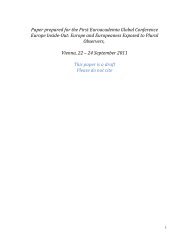Daniel Kný Transformation of German-European ... - Euroacademia
Daniel Kný Transformation of German-European ... - Euroacademia
Daniel Kný Transformation of German-European ... - Euroacademia
You also want an ePaper? Increase the reach of your titles
YUMPU automatically turns print PDFs into web optimized ePapers that Google loves.
<strong>Transformation</strong> <strong>of</strong> <strong>German</strong>-<strong>European</strong> identity in the Eurozone crisis:<br />
an empirical study <strong>of</strong> public opinion in <strong>German</strong>y<br />
<strong>Daniel</strong> Kný<br />
University <strong>of</strong> Economics, Prague<br />
Abstract<br />
Has the Eurozone crisis, which has began in 2010, already had some influence on the transformation <strong>of</strong> the relatively<br />
stable relationship between national and <strong>European</strong> dimensions <strong>of</strong> <strong>German</strong> collective identity Has the strength <strong>of</strong> the<br />
<strong>European</strong> identity somehow changed in <strong>German</strong>y Can one observe rising instillation <strong>of</strong> “<strong>European</strong> values” in <strong>German</strong><br />
national identity or widening gap between sense <strong>of</strong> <strong>German</strong>ness and <strong>European</strong>ness On one hand, the issue <strong>of</strong><br />
<strong>European</strong> integration gained immensely on salience thanks to the unprecedented media attention which could lead to<br />
strengthening <strong>of</strong> <strong>European</strong> identity in <strong>German</strong>y. On the other hand, there is quite a significant opposition to the<br />
financial help to peripheral member states in <strong>German</strong> publics which could be interpreted as weakening <strong>of</strong> the sense <strong>of</strong><br />
mutual <strong>European</strong> solidarity and <strong>European</strong> dimension <strong>of</strong> <strong>German</strong> collective identity. The main research questions <strong>of</strong><br />
this contribution are whether the Eurozone crisis has let to decline or rise in <strong>European</strong> identity in <strong>German</strong>y and any<br />
substantial changes in the complementarity <strong>of</strong> national and <strong>European</strong> dimensions <strong>of</strong> <strong>German</strong> collective identity. The<br />
research is based on the quantitative data from attitudinal surveys and their proper interpretation following from the<br />
appropriate set <strong>of</strong> statistical analyses (logistic regression, crosstabulation). I conclude that in fact, there is no apparent<br />
tendency neither with regard to strengthening nor weakening <strong>of</strong> the <strong>European</strong> identity in <strong>German</strong>y observable during<br />
the crisis despite the fact that the support for membership or trust in the EU and <strong>European</strong> Commission are declining.<br />
At the same time one can observe declining complementarity between national and <strong>European</strong> dimensions <strong>of</strong> <strong>German</strong><br />
collective identity. However this tendency seems to reach beyond the crisis. I contend that in the case the crisis is<br />
protracted, one can expect negative effects <strong>of</strong> the crisis on the extension <strong>of</strong> the <strong>European</strong> identity in <strong>German</strong>y.<br />
Key words<br />
Eurozone, crisis, <strong>German</strong>y, <strong>European</strong> identity, national identity<br />
Introduction<br />
The Eurozone crisis has already had an immense influence on the development <strong>of</strong> the <strong>European</strong> integration. Earlier<br />
unconceivable drafts have been passed by co-legislators (e.g. the so called Six-pack and Two-pack – see <strong>European</strong><br />
Parliament 2013; <strong>European</strong> Commission 2012b), the <strong>European</strong> Commission has come up with a “Green paper on the<br />
feasibility <strong>of</strong> introducing Stability Bonds” (see <strong>European</strong> Commission 2011a) and with a “Blueprint for deep and<br />
genuine economic and monetary union” (see <strong>European</strong> Commission 2012a) and the <strong>European</strong> Central Bank has<br />
undertaken special and unusual operations in order to lower the pressure on interest rates <strong>of</strong> some Eurozone countries´<br />
bonds (<strong>European</strong> Central Bank 2012). Substantial financial help (in the form <strong>of</strong> loans) from various sources (e.g.<br />
<strong>European</strong> Financial Stability Facility - EFSF, <strong>European</strong> Financial Stabilization Mechanism - EFSM, <strong>European</strong><br />
Stability Mechanism – ESM; see <strong>European</strong> Financial Stability Facility 2013 and <strong>European</strong> Commission 2013) has<br />
been introduced to the most indebted Eurozone countries and the <strong>European</strong> Council has agreed on the main guidelines<br />
for the establishment <strong>of</strong> the Single Supervisory Mechanism (SSM) as one <strong>of</strong> the main pillars <strong>of</strong> the emerging banking<br />
union (Council <strong>of</strong> the <strong>European</strong> Union 2012). These decisions and measures have been made under the high pressure<br />
<strong>of</strong> financial markets and with large disgust <strong>of</strong> public opinion in some countries. The austerity measures in countries<br />
like Greece, Ireland, Portugal, Spain, Italy or Cyprus have caused a lot <strong>of</strong> anger among their inhabitants (Smith 2012).<br />
At some point <strong>of</strong> the crisis various economists and politicians were making open statements about the possibility <strong>of</strong><br />
the breakup <strong>of</strong> the Eurozone and its plausible damaging impacts on the development <strong>of</strong> the <strong>European</strong> integration in its<br />
entirety (“No Time to Lose: Juncker Says Crisis Has Reached 'Decisive Point'.” 2012).<br />
In relation to the crisis it is <strong>of</strong>ten spoken about identities, stereotypes, cultures etc. On one hand, there is quite a<br />
passionate discussion, whether there is some kind <strong>of</strong> common <strong>European</strong> identity and <strong>European</strong> demos, which would<br />
justify the transfer <strong>of</strong> various powers from national to the supranational level <strong>of</strong> governance (McCormick 2010, 9,<br />
216-220; Delanty and Rumford 2005, 54; De Beus 2001, 288-289; Cram 2009, 110, 124). However, on the other hand,<br />
possible effects <strong>of</strong> this crisis on the perceptions <strong>of</strong> collective identities by the <strong>European</strong> citizens have not been<br />
discussed enough. The Eurozone crisis began three years ago and it is not clear whether it is approaching to its end.<br />
Therefore, it is clear that any final conclusions about the effects <strong>of</strong> the crisis on the collective identities <strong>of</strong> <strong>European</strong>s











